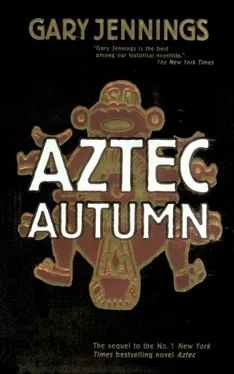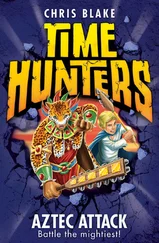Gary Jennings - Aztec Autumn
Здесь есть возможность читать онлайн «Gary Jennings - Aztec Autumn» весь текст электронной книги совершенно бесплатно (целиком полную версию без сокращений). В некоторых случаях можно слушать аудио, скачать через торрент в формате fb2 и присутствует краткое содержание. Жанр: Старинная литература, на английском языке. Описание произведения, (предисловие) а так же отзывы посетителей доступны на портале библиотеки ЛибКат.
- Название:Aztec Autumn
- Автор:
- Жанр:
- Год:неизвестен
- ISBN:нет данных
- Рейтинг книги:4 / 5. Голосов: 1
-
Избранное:Добавить в избранное
- Отзывы:
-
Ваша оценка:
- 80
- 1
- 2
- 3
- 4
- 5
Aztec Autumn: краткое содержание, описание и аннотация
Предлагаем к чтению аннотацию, описание, краткое содержание или предисловие (зависит от того, что написал сам автор книги «Aztec Autumn»). Если вы не нашли необходимую информацию о книге — напишите в комментариях, мы постараемся отыскать её.
Readers familiar with Mexican history will welcome the rich details of this vengeance drama; those new to it will be impressed by Jennings's exhaustive research.
Aztec Autumn — читать онлайн бесплатно полную книгу (весь текст) целиком
Ниже представлен текст книги, разбитый по страницам. Система сохранения места последней прочитанной страницы, позволяет с удобством читать онлайн бесплатно книгу «Aztec Autumn», без необходимости каждый раз заново искать на чём Вы остановились. Поставьте закладку, и сможете в любой момент перейти на страницу, на которой закончили чтение.
Интервал:
Закладка:
It mattered not to me that the Yaki men spent half their lives in dancing for reasons that I deemed absurd. What mattered was that the other half of their lives they dedicated to pure savagery, and that was what I wanted from them. When G'nda Ké translated my words to the five yo'otuí, they very pleasantly surprised me by being more receptive to my message than some of the Rarámuri chiefs had been.
"White men..." murmured one of the elders. "Yes, we have heard of white men. Our cousins, the To'ono O'otam, claimed to have had some of those wandering through their country. They even mentioned a black man."
Another grumbled, "What is the world coming to? Men should all be one color. Our color."
And another cautioned, "How can we know if the degenerate Desert People spoke truly? Had they been Yaki, now, they would have taken scalps to prove the existence of such beings."
And he was reminded by another, "We have never seen scalps of the evil chapáyekám, but we know they exist. And they are of no color at all."
And the fifth, the elder in charge of warfare, said, "I believe it would do our yoem'sontáom good to fight someone besides their own relatives for a change. I vote that we lend them to this outlander."
"I concur," said the elder in charge of the village work. "If this outlander speaks truly about the rapacity of the white men, we may someday not have any relatives to fight, anyway."
"I agree," said the Leader of the Dances. "Let us keep here only the Deer Dancer and enough other dancers to satisfy Old Man and Our Mother."
"And to repulse the chapáyekám," said the Keeper of the Customs.
"Surely all others of our color," said the elder who governed religion, "will wish to join in annihilating those of different color. I vote that we invite our cousins the Ópata and Káhita to participate."
The warfare elder spoke up again. "And why not our cousins the To'ono O'otam as well? This would be the grandest-ever alliance of relatives. Yes, that is what we will do."
So it was arranged. Bakúm would send a warrior "bearing the staff of truce" to relay my message to all the others of the Eight Sacred Towns, and a second messenger to the far-off Desert People. I promised two things in return for such generous cooperation. I would appoint one of my own warriors to lead all the Yaki men south to our gathering place at Chicomóztotl, and the other to wait here in Bakúm to guide the Desert People's warriors when they came. I would also, when all those yoem'sontáom got to Chicomóztotl, equip them with obsidian weapons far superior to theirs of flint. The elders accepted my offer of guides, but indignantly rejected the offer of weapons. What had been good enough for Old Man, and for their every male ancestor since, was good enough for modern warfare, they said, and I prudently did not argue the matter.
I was glad we had reached agreement when we did, for thereafter I was deprived of my means of communicating with the Yaki. G'nda Ké claimed to be feeling ever more ill, and incapable of even the exertion of interpreting. Indeed, she looked ill, her complexion having faded almost to the pallor of a white woman, so that her freckles were her most visible feature. When even the elder in charge of work, and the women who had worked her so hard, allotted her a domed hut of her own in which to lie and rest, it seemed they had decided—since she was not about to give birth—that she must be about to die. But I, knowing G'nda Ké, dismissed that notion. I was sure that her prostration was just another of her ruses, doubtless her way of expressing her vexation at my having been more cordially accepted by her own people than she had been.
XXIV
While we waited for the men of the other Yaki branches to assemble, Machíhuiz, Acocótli and I occupied our time in doing a sort of training of the Mayo warriors of Bakúm. That is to say, we mock-fought against them with our swords and javelins of obsidian edges and points, so that they would learn to parry such assaults with their primitive weapons. It was not that I expected the Yaki ever to be battling against the men of my own army. But I was fairly certain that when my army fully engaged the Spaniards, they would add to their ranks many of their native allies, such as the Texcaltéca who had helped the white men in their long-ago overthrow of Tenochtítlan. And those allies would not be carrying arcabuces, but obsidian-bladed maquáhuime and spears and javelins and arrows.
It was rather a slow and awkward process, training these yoem'sontáom without someone to translate my commands and instructions and advice. But warriors of every race and nation, probably even the white ones, share an instinctive understanding of each other's movements and gestures. So the Mayo men had not too much trouble learning our Aztéca arts of thrusts and slashes and feints and withdrawals. They learned so well, in fact, that I and my two companions frequently got bruised by their dense-wood war clubs and pricked or scratched by their triple-flint spears. Well, of course, we three gave as good as we got, so I kept the Tícitl Ualíztli always in attendance at our training sessions, to apply his arts when necessary. And I gave no thought whatever to the absent G'nda Ké until, one day, a Bakúm woman came and timidly tugged at my arm.
She led me—and Ualíztli came along—to the little cane hut that had been lent to G'nda Ké. I went in first, but what I saw made me instantly back out and motion for the tícitl to enter instead. Clearly, G'nda Ké had not been pretending; she appeared to be as near dying as the villagers had earlier supposed.
She lay stretched out naked on a reed pallet, and she was copiously sweating, and she had somehow got extremely fat, not just in the places where well-fed women often do, but all over —nose, lips, fingers, toes. Even her eyelids had become so fat that they practically closed her eyes. As she once had told me, G'nda Ké was freckled over her whole body, and now, with that body so bloated, her countless freckles were so large and distinct that she might have grown a jaguar's skin. In my one brief glance, I had seen the Mayo tícitl squatting beside her. I never yet had glimpsed that man's face, but even the grim-visaged mask he wore seemed now to have a puzzled and helpless expression, and he was only listlessly shaking his curative wooden rattle.
Ualíztli emerged from the hut, looking rather perplexed himself, and I asked him, "What could they possibly have been feeding her, to make her so grossly fat? In this Yaki land, I have never seen a woman more than meagerly fed."
"She has not grown fat, Tenamáxtzin," he said. "She is swollen with putrid fluids."
I exclaimed, "A simple spider bite could have done that?"
He gave me a sidelong look. "She says it was you, my lord, who bit her."
"What?!"
"She is in excruciating agony. And much as we all have loathed the woman, I am sure you would wish to be a little merciful. If you will tell me what kind of poison you applied to your teeth, I might be able to give her a more easeful death."
"By all the gods!" I raged. "I have long known that G'nda Ké is criminally insane, but are you?"
He quailed away from me, stammering, "Th-there is a horribly gaping and suppurating sore on her ankle..."
Through gritted teeth I said, "I grant you, I have often contemplated how I might most ingeniously slay G'nda Ké, when she was of no more use to me. But bite her to death? In your wildest imaginings, man, can you credit that I would put my mouth to that reptile? If ever I did that, I would be the one poisoned and suffering and suppurating and dying! It was a spider that bit her. While she was gathering wood. Ask any of the drabs who first attended her."
Читать дальшеИнтервал:
Закладка:
Похожие книги на «Aztec Autumn»
Представляем Вашему вниманию похожие книги на «Aztec Autumn» списком для выбора. Мы отобрали схожую по названию и смыслу литературу в надежде предоставить читателям больше вариантов отыскать новые, интересные, ещё непрочитанные произведения.
Обсуждение, отзывы о книге «Aztec Autumn» и просто собственные мнения читателей. Оставьте ваши комментарии, напишите, что Вы думаете о произведении, его смысле или главных героях. Укажите что конкретно понравилось, а что нет, и почему Вы так считаете.











